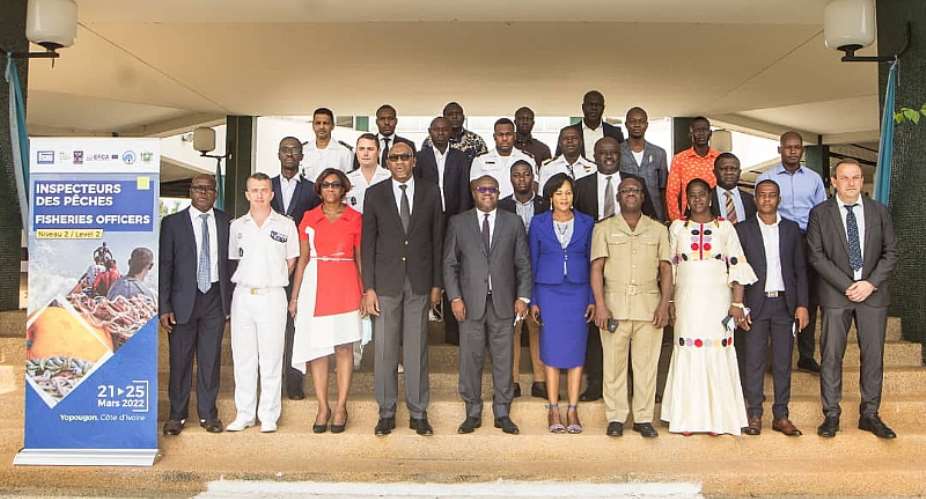The International Security Management Institute (ISMI) last Friday successfully completed its "Fishery Inspector - Level 2" course aimed at addressing illegal, unreported, and unregulated (IUU) fishing.
The course which commenced on Monday, March 21, 2022, was held at the Regional Academy of Marine Sciences and Techniques (ARSTM) in Yopougon, Abidjan, and ended on Friday, March 25, 2022.
The technical training corresponds to the second level of a professionalizing curriculum for fisheries inspectors.
In the Gulf of Guinea, illegal fishing represents 40% to 60% of the catches. The abundant fish resources in the area attract suitors from all over the world, ready to cross the oceans to fish off the coast of West and Central Africa. The loss of income for the countries of the region is colossal.
Illegal, unreported, and unregulated (IUU) fishing thus constitutes a serious threat to fish stocks and the marine environment. It deprives coastal States and their populations of sources of food and income.
While there are increasingly close links between IUU fishing and maritime piracy, the former "feeds" the latter, and vice versa.
Speaking on the opening day of the Fishery Inspector - Level 2 training course, the Regional Coordinator of the State Action at Sea from the French Cooperation Guillaume Turquet de Beauregard reminded participants that the course is a continuation of a level 1 training on the same subject that took place at ISMI in 2021.
He said IUU fishing in the Gulf of Guinea encompasses many illegal activities that go beyond the traditional description, and the enforcement response that would be required is beyond the investigative and prosecutorial capacity and expertise of most national fisheries authorities.

According to the Chief Maritime Affairs Officer, the transnational scope and complexity of these activities requires extensive cooperation between law enforcement agencies within countries and across national borders, adding that this is why the seminar is being held to foster cooperation between states in order to identify useful synergies, to promote information exchange and to create a network of knowledge beyond our borders.
In his address, Guillaume Turquet de Beauregard charged participants to take seriously the seminar and make good use of it.
“This is why this seminar is of particular importance and must be treated with the utmost seriousness. IUU fishing is a key factor that contributes to the strengthening of maritime insecurity in the region. The training and strengthening of the skills of fisheries inspectors is not a luxury, but a necessity that appears more urgent every day," he said.
He continued, "It is this kind of initiative that must be encouraged at all costs. ISMI is trying at its modest level to change the course of things.
"It is therefore a real pleasure to be with you today, and I am delighted with the director of ISMI and my colleagues to be able to launch this training that contributes to the strengthening of maritime security in the Gulf of Guinea."
The seminar is organized and financed by the French cooperation, with strong support from Ivorian State.
In all, about twenty participants from 14 countries in the Gulf of Guinea participated in the course.
The training was provided by experts from Côte d'Ivoire and the PESCAO program of the European Fisheries Control Agency (EFCA).
Guillaume Turquet de Beauregard while expressing appreciation to organisers of the seminar, also thanked Mr. Bruno MORIN from the European Fisheries Control Agency (PESCAO program) and Mr. Serge KPI from the Ivorian Fisheries Directorate.







 Saglemi Housing Project will not be left to rot – Kojo Oppong Nkrumah
Saglemi Housing Project will not be left to rot – Kojo Oppong Nkrumah
 Transport fares hike: GPRTU issue two-day ultimatum
Transport fares hike: GPRTU issue two-day ultimatum
 ARC endorses Alan as presidential candidate – Buaben Asamoa
ARC endorses Alan as presidential candidate – Buaben Asamoa
 Akufo-Addo appoints Kwasi Agyei as new Controller and Accountant-General
Akufo-Addo appoints Kwasi Agyei as new Controller and Accountant-General
 PNC dismiss reports of mass resignations
PNC dismiss reports of mass resignations
 PAC advocates for revenue collectors to be engaged on commission basis, not full...
PAC advocates for revenue collectors to be engaged on commission basis, not full...
 Genser Energy commissions 110km of natural gas pipeline at Anwomaso
Genser Energy commissions 110km of natural gas pipeline at Anwomaso
 Naa Torshie calls for tolerance, peace ahead of 2024 election
Naa Torshie calls for tolerance, peace ahead of 2024 election
 Asantehene commends Matthew Opoku Prempeh for conceiving GENSER Kumasi Pipeline ...
Asantehene commends Matthew Opoku Prempeh for conceiving GENSER Kumasi Pipeline ...
 Let’s do away with ‘slash and burn politics’ in Ghana — Dr Adutwum
Let’s do away with ‘slash and burn politics’ in Ghana — Dr Adutwum
